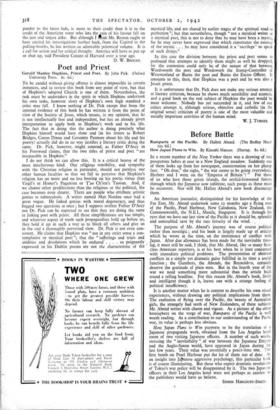Poet and Priest
To be candid without giving offence is almost impossible in certain instances, and to review this book from any point of view, but that of Hopkins's adopted Church is one of them. Nevertheless, the task must be undertaken in the spirit in which Hopkins undertook his own tasks, however short of Hopkins's own high standard a fall. critic may fa. I know nothing of Dr. Pick except that from the internal evidence of this book he has written it from the point of view of the Society of Jesus, which means, in my opinion, that he is not intellectually free and independent, but has an already given interpretation to apply both to Hopkins's work and to his life. The fact that in doing this the author is doing precisely what Hopkins himself would have done and (in his letters to Robert Bridges, Canon Dixon and Coventry Patmore about his life and his poetry) actually did do in no way justifies a literary critic doing the same. Dr. Pick, however, might contend, as Father D'Arcy in his Foreword claims, that the two titles of priest and poet " are inseparable in Hopkins."
I do not think we can allow this. It is a critical heresy of the most mischievous kind. Our religious sensibility, and sympathy with the Christian religion in particular, should not paralyse our other human faculties so that we fail to perceive that Hopkins's religion has no more and no less bearing on his poetic virtue than Virgil's or Homer's Paganism or T'ao Ch'ien's Taoism. And, if we choose other predilections than the religious or the political, the case becomes even clearer. There are people who attribute artistic genius to tuberculosis. A writer named Max Nordau once had a great vogue. He linked genius with • moral degeneracy, and thus begged two questions at once ; but I suppose neither Father D'Arcy nor Dr. Pick can be expected to see that they are doing the same in linking poet with priest. All these simplifications are too simple, and whatever aspect of truth such propagandists hold up before us, they hold it up in such a way as to block all others and give us in the end a thoroughly perverted view. Dr. Pick is not even con- sistent. He claims that Hopkins was " not in any strict sense a con- templative or mystical poet "; that the " sufferings and trials and aridities and desolations which he endured' . . . . so poignantly expressed in his Dublin poems are not the characteristic of the mystical life, and are shared by earlier stages of the spiritual road to perfection "; but that nevertheless, though "not a mystical writer or a mystical poet, this is not to deny that he may have been a mystic, for he may never have expressed that which constitutes the essence of the mystic . . . he may have considered it a ' sacrilege' to speak of such things."
In this case the division between the priest and poet seems so profound that attempts to identify them might as well be dropped, fol the connexion could only be of the nature of that between Wordsworth the poet and Wordsworh the Stamp-Controller of Westmorland or Burns the poet and Burns the Excise Officer. It amounts to this, then, that Hopkins was a poet and he was also a Jesuit priest.
It is unfortunate that Dr. Pick does not make any serious attempt at literary criticism, because he shows much sensibility and acumen, and a good book on the real subject of Hopkins the poet would be most welcome. Nobody has yet succeeded in it, and few of our critics attempt it, although serious, objective and catholic (in the original sense) criticism of poetry is one of the most valuable and socially important activities of the human mind.
W. J. TURNER.


























 Previous page
Previous page